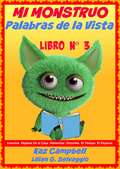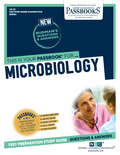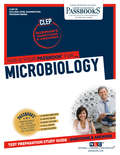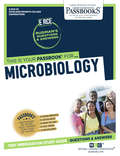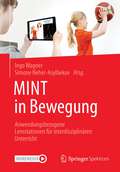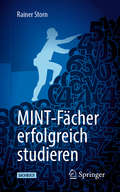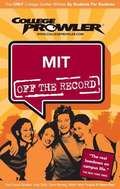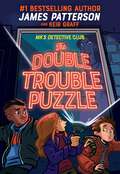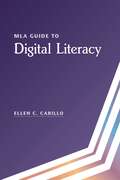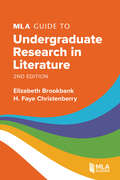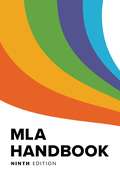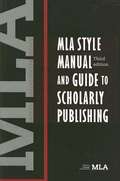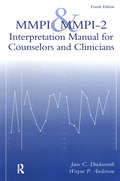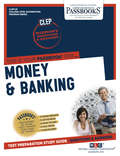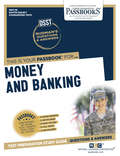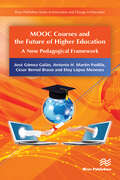- Table View
- List View
MI MONSTRUO- Palabras de la Vista. Nivel 1- Libro Nª3
by Kaz Campbell Lilian G. SelvaggioAprende a Leer con PALABRAS DE LA VISTA, Libro Nº 3, es para lectores iniciales. El Libro Nª 3 contiene màs de 100 páginas con coloridas e interesantes figuras de insectos, objetos, alimentos, deportes, estado del tiempo, el espacio, y palabras para unir ideas con sus correspondientes palabras. Este es el 3er. Libro de la serie Mi Monstruo aprende a leer. Al trabajar con esta serie de libros serás capaz de enseñar a tu hijo a leer y le darás un fuer envión inicial. Hay 3 libros de Palabras de la Vista en el Nivel 1 (palabras individuales e imágenes) y cada libro cubre 7 àreas diferentes. Los libros de la serie Aprende a Leer están enumerados, por lo que es conveniente comenzar con el Libro Nª 1 y continuar trabajando con los siguientes. Los libros de Nivel 2 (hay también 3 libros en este nivel) también contienen Palabras de la Vista, pero en lugar de palabras individuales, están combinadas en fases cortas y oraciones simples. Una figura acompaña cada frase u oración, haciendo màs fácil la lectura para tu niño.La serie Mi Monstruo Aprende a Leer es la manera perfecta de enseñar a tu hijo a leer. Este libro también tiene una cantidad de consejos para ayudar a los padres a enseñar a leer a sus hijos.
MICROBIOLOGY: Passbooks Study Guide (Certified Nurse Examination Series #Vol. Clep-35)
by National Learning CorporationThe Certified Nurse Examination Series prepares individuals for licensing and certification conducted by the American Nurses Credentialing Center (ANCC), the National Certification Corporation (NCC), the National League for Nursing (NLN), and other organizations. The Microbiology Passbook® provides a series of informational texts as well as hundreds of questions and answers in the areas that will likely be covered on your upcoming exam.
MICROBIOLOGY: Passbooks Study Guide (College Level Examination Program Series (CLEP) #Vol. Clep-35)
by National Learning CorporationThe College Level Examination Program (CLEP) enables students to demonstrate college-level achievement and earn college credit in various subject areas based on knowledge acquired through self-study, high school and adult courses, or through professional means. The CLEP Microbiology Passbook® prepares you by sharpening knowledge of the skills and concepts necessary to succeed on the upcoming exam and the college courses that follow. It provides a series of informational texts as well as hundreds of questions and answers in the areas that will likely be covered on your upcoming exam.
MICROBIOLOGY: Passbooks Study Guide (Excelsior/Regents College Examination Series #Vol. Clep-35)
by National Learning CorporationThe Excelsior/Regents College Examinations (E/RCE) offer you an opportunity to obtain recognition for college-level learning and consists of exams designed to demonstrate achievement and mastery of various college-level subjects, such as the Arts and Sciences, Business, Criminal Justice, Education, Health and Nursing. The E/RCE Microbiology Passbook® prepares you by sharpening knowledge of the skills and concepts necessary to succeed on the upcoming exam and the college courses that follow. It provides a series of informational texts as well as hundreds of questions and answers in the areas that will likely be covered on your upcoming exam.
MINT in Bewegung: Anwendungsbezogene Lernstationen für interdisziplinären Unterricht
by Ingo Wagner Simone Neher-AsylbekovFür viele Herausforderungen der modernen Gesellschaft ist ein vernetztes und fachübergreifendes Denken notwendig. Damit Referendar*innen und Lehrkräfte diese fachübergreifende Denkweise besser in den Unterricht einbringen können, werden in diesem Buch 13 umfangreich aufbereitete und interdisziplinäre Lerneinheiten vorgestellt.Sie ermöglichen einen innovativen Zugang durch die Verknüpfung von MINT-Inhalten (Mathematik, Informatik, Naturwissenschaften und Technik) mit sportlichen Bewegungen, die die Lernenden am eigenen Körper direkt erfahren können. Hierfür sind die Lerneinheiten in Stationen organisiert und enthalten fundierte Sachanalysen. Zudem werden ausführliche didaktische Hintergründe, wie z. B. antizipierte Ergebnisse, mögliche Probleme und Differenzierungsoptionen, bereitgestellt. Zusätzliche Materialien, wie beispielsweise Lösungsblätter, sind ergänzend kostenlos online abrufbar. Die Lerneinheiten stammen aus dem Schülerlabor „MINT in Bewegung“ am Karlsruher Institut für Technologie (KIT) und bereichern den Unterricht durch spannende Versuche sowie praktisches Arbeiten mit naturwissenschaftlichen Methoden und Messgeräten. Sie eignen sich für Schüler*innen der Sekundarstufe 1 aller Schulformen. Für Lehrkräfte ergibt sich hierdurch eine innovative Möglichkeit, traditionelle Lehrmethoden um neue Perspektiven zu erweitern.
MINT-Fächer erfolgreich studieren
by Rainer StornSie haben vor, ein MINT-Fach zu studieren und dabei das bestmögliche Ergebnis für Ihren Einsatz zu bekommen? Dann erfahren Sie hier, wie die richtigen Verhaltensweisen, Lernstrategien und organisatorischen Feinheiten Ihr Studienergebnis verbessern können, indem Sie die richtigen Dinge tun und keine Energie auf Unnötiges verschwenden. Lernen Sie:Was Sie tun müssen, wenn Sie in der Vorlesung abgehängt werdenWie Sie optimal lernen und das nötige Wissen effizient in Ihrem Gedächtnis verankernWie Sie sich strategisch auf eine Prüfung vorbereiten, so wie ein Spitzensportler auf die MeisterschaftWie Sie in der Prüfung die Nervosität dämpfen und die Prüfungszeit am effizientesten nutzenWie Sie Ihre Abschlussarbeit systematisch zu guter Qualität führenWie Sie Ihre Arbeit interessant und überzeugend präsentierenUnd welche Dinge im Vorstellungsgespräch besonders wichtig sind Dieses Buch wird Ihnen nicht nur helfen, Ihr Studium so effizient wie möglich zu gestalten. Es zeigt Ihnen auch zahlreiche Vorgehensweisen, die während Ihrer gesamten beruflichen Laufbahn wichtig sein werden und in vielen Fällen für Ihren Erfolg sogar unabdingbar sind.
MIT (College Prowler)
by Susie LeeA class project turned company, College Prowler produces guidebooks that are written by actual college students and cover the things students really want to know.
MK's Detective Club: The Double Trouble Puzzle
by James Patterson Keir GraffDiscover Nancy Drew for a new generation, packed with thrills, chills, and even laughs—from #1 bestselling mystery maven James Patterson. Minerva Keen is the absolute best kid detective Chicago has ever seen, and she&’s hungry for a new mystery to solve with her friends. But a know-it-all new girl, Zoe, tries to take control of MK&’s detective club. Worse still, Ms. Claire Voyant, who has always had a soft spot for Minerva, takes Zoe's side. It&’s clear to Minerva that someone…or something has taken over her favorite teacher. Add in terrifying nightmares, the return of Minerva&’s parents (who come home with more dangerous baggage than just their luggage), and some shocking developments—MK&’s Detective Club just might have more mysteries than they can solve. With nowhere to turn, the club walks right into danger…and the stakes just might be deadly.For more MK&’s Detective Club adventures, don't miss MK's Detective Club: The Poison Puzzle!
MLA Guide to Digital Literacy
by Ellen C. CarilloStudents face challenges assessing, responding to, and producing information in today's fast-paced, complex digital landscape. This guide helps students understand why digital literacy is a critically important skill: their education, future careers, and participation in democratic processes rely on it. Hands-on, structured activities give students strategies for evaluating the credibility of sources, detecting fake news, understanding bias, and more. Readings and writing prompts support specific concepts, including how to craft a research question and effectively conduct searches. An appendix contains three sample lesson plans.
MLA Guide to Undergraduate Research in Literature (MLA GUIDES)
by Elizabeth Brookbank H. Faye ChristenberryWhat makes a good research topic in a literature class? What does your professor mean by "peer-reviewed" sources? What should you do if you can't find enough material? This approachable guide walks students through the process of research in literary studies, providing them with tools for responding successfully to course assignments.Written by two experienced librarians, the guide introduces the resources available through college and university libraries and explains how to access the ones a student needs. It focuses on research in literature, identifying relevant databases and research guides and explaining different types of sources and the role each plays in researching and writing about a literary text. But it also contains helpful information for any student researcher, describing strategies for searching the web to find the most useful material and offering guidance on organizing research and documenting sources with MLA style.Extensively updated and revised, the second edition emphasizes digital resources that can be accessed remotely, offers critical thinking strategies for evaluating sources, and includes more information on writing about audiovisual as well as written works.This book contains an introduction and the chapters "Starting the Research Process," "Searching Your Library Discovery System or Catalog," "Searching Subject-Specific Databases," "Searching the Internet," "Finding Reviews," "Using Contextual Primary Sources," "Finding Background Information," "Managing Sources and Creating Your Bibliography," and "Guides to Research in Literature Written in English" as well as a bibliography of sources for studying literature in English and a glossary of terms.
MLA Handbook (MLA Handbook)
by The Modern Language Association of AmericaThe ninth edition works as both a textbook and a reference guide. Focusing on source evaluation, it features a wealth of visual examples and updated advice on punctuation and grammar, footnotes and endnotes, annotated bibliographies, and paper formatting. An all-in-one resource that makes MLA style easier to learn and use, the MLA Handbook includes: Expanded, in-depth guidance on creating works-cited-list entries using the MLA template of core elements that explains what each core element is, where to find it in various sources, and how to style it. A new, easy-to-follow explanation of in-text citations. A new chapter containing recommendations for using inclusive language. A new appendix with hundreds of sample works-cited-list entries by publication format, including books, databases, websites, YouTube videos, interviews, and more. Updated guidelines on avoiding plagiarism.
MLA Style Manual and Guide to Scholarly Publishing (3rd Edition)
by The Modern Language Association of AmericaA complete, up-to-date guide for writing scholarly texts, documenting research sources, submitting manuscripts to publishers, and dealing with legal issues surrounding publication.
MMPI And MMPI-2: Interpretation Manual For Counselors And Clinicians
by Jane C. Duckworth Wayne P. AndersonFirst published in 1995. Routledge is an imprint of Taylor & Francis, an informa company.
MODERN LITERATURE II (1700-1850), M.A. ENGLISH (Previous) PAPER IV, School Of Distance Education, Andhra University
by M. V. RAJA KUMAR Mrs Ila Rao Mrs K. Lakshmi Devi Prof L.S.R. Krishna Sastry Mrs T. PadmaThis is the prescribed material for students pursuing MA English for previous year (first year) Paper 4 Modern Literature 2 (1700-1850)
MONEY & BANKING: Passbooks Study Guide (College Level Examination Program Series (CLEP) #Vol. Clep-25)
by National Learning CorporationThe College Level Examination Program (CLEP) enables students to demonstrate college-level achievement and earn college credit in various subject areas based on knowledge acquired through self-study, high school and adult courses, or through professional means. The CLEP Money & Banking Passbook® prepares you by sharpening knowledge of the skills and concepts necessary to succeed on the upcoming exam and the college courses that follow. It provides a series of informational texts as well as hundreds of questions and answers in the areas that will likely be covered on your upcoming exam.
MONEY AND BANKING: Passbooks Study Guide (DANTES Subject Standardized Tests (DSST) #Vol. Clep-25)
by National Learning CorporationThe DSST Subject Standardized Tests are comprehensive college and graduate level examinations given by the Armed Forces, colleges and graduate schools. These exams enable students to earn college credit for what they have learned through self-study, on the job, or by other non-traditional means. The DSST Money & Banking Passbook® prepares candidates for the DSST exam, which enables schools to award credit for knowledge acquired outside the normal classroom environment. It provides hundreds of questions and answers in the areas that will likely be covered on your upcoming exam, including but not limited to: the Federal Reserve; inflation; national and international financial policies; commercial banking; and more.
MOOC Courses and the Future of Higher Education: A New Pedagogical Framework
by José Gómez Galán Antonio H. Padilla César Bernal BravoDuring the last decades, our society is witnessing an authentic revolution that, in a dizzying manner has deeply influenced, modified, and transformed the way of life of human beings. This constant and unstoppable revolution is transmuting all areas of our life: social, cultural, personal, labor, economic, training, etc. This new society is characterized by a high generation of knowledge and the constant and fluid processing of information. In this macro-context, the MOOC phenomenon emerged. MOOC (Massive Open Online Courses) courses are based on the principles of massive, free access to all materials and resources offered online. This new didactic path can be constituted in an innovative techno-social tendency, especially oriented in the panorama of Higher Education to stimulate university improvement, open opportunities at the same time for education and training or, simply, derive towards a new business model for the universities. In addition to being an entry point for the popularization of science and knowledge, the future possibilities are enormous and are being studied in all their various dimensions. Many initiatives as a result have been developed to implement this new form of education. MOOC Courses and the Future of Higher Education presents the latest research theories and current examples of MOOC courses practices in Higher Education. The chapters represent an extensive assortment of interpretations and practices examples of MOOC courses, across areas as varied as teaching methodologies, instructional innovations, educational technology, etc. This work is structured in three sections, the first one covers the university institution in the knowledge society, the second analyzes the MOOC training proposals, and the third discusses the future role of MOOCs. Technical topics discussed in the book include: The Virtualization of Teaching in Higher EducationTraining and Professional Development at the e-UniversityTaxonomy of MOOCsMOOC: Strengths and WeaknessesMOOCs and the Scientific Community: Challenges and InnovationMOOC PlatformsDirectory of MOOC ResourcesMOOC: Reflections of the Future

